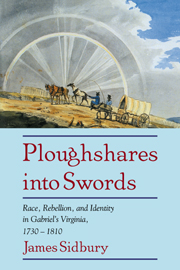Book contents
- Frontmatter
- Contents
- Acknowledgments
- Introduction
- Prologue: From Blacks in Virginia to Black Virginians
- 1 The emergence of racial consciousness in eighteenth-century Virginia
- Part I Cultural process: Creolization, appropriation, and collective identity in Gabriel's Virginia
- Part II Social practice: Urbanization, commercialization, and identity in the daily life of Gabriel's Richmond
- Epilogue: Gabriel and Richmond in historical and fictional time
- Appendix: Richmond households in 1784 and 1810
- Index
Epilogue: Gabriel and Richmond in historical and fictional time
Published online by Cambridge University Press: 04 August 2010
- Frontmatter
- Contents
- Acknowledgments
- Introduction
- Prologue: From Blacks in Virginia to Black Virginians
- 1 The emergence of racial consciousness in eighteenth-century Virginia
- Part I Cultural process: Creolization, appropriation, and collective identity in Gabriel's Virginia
- Part II Social practice: Urbanization, commercialization, and identity in the daily life of Gabriel's Richmond
- Epilogue: Gabriel and Richmond in historical and fictional time
- Appendix: Richmond households in 1784 and 1810
- Index
Summary
Gabriel and his followers sought freedom in the Richmond of 1800, and understanding their struggle requires understanding their world. The meanings of their struggle, however, have not been limited to the time and place in which they lived and worked, built families and worshipped their God, resisted and accommodated to their oppressors. Gabriel's Conspiracy was defeated, but it was not destroyed. It lived on in the folk memories of Black Virginians, and, through those folk memories, it influenced the collective identity of Americans of African descent and the collective struggle against slavery and oppression. Stories about Gabriel were used to inspire resistance to slavery, and to support an argument for Black nationalism. Nor was the conspiracy's meaning limited to the antebellum period. During the 1930s Arna Bontemps wrote a novel based on Gabriel's Conspiracy, a novel that explored the relationships among literacy, traditional oral culture, and natural rights philosophy, while seeking to inspire a much later generation to heed Gabriel's call and struggle to complete the liberation of Americans of African descent.
- Type
- Chapter
- Information
- Ploughshares into SwordsRace, Rebellion, and Identity in Gabriel's Virginia, 1730–1810, pp. 255Publisher: Cambridge University PressPrint publication year: 1997

